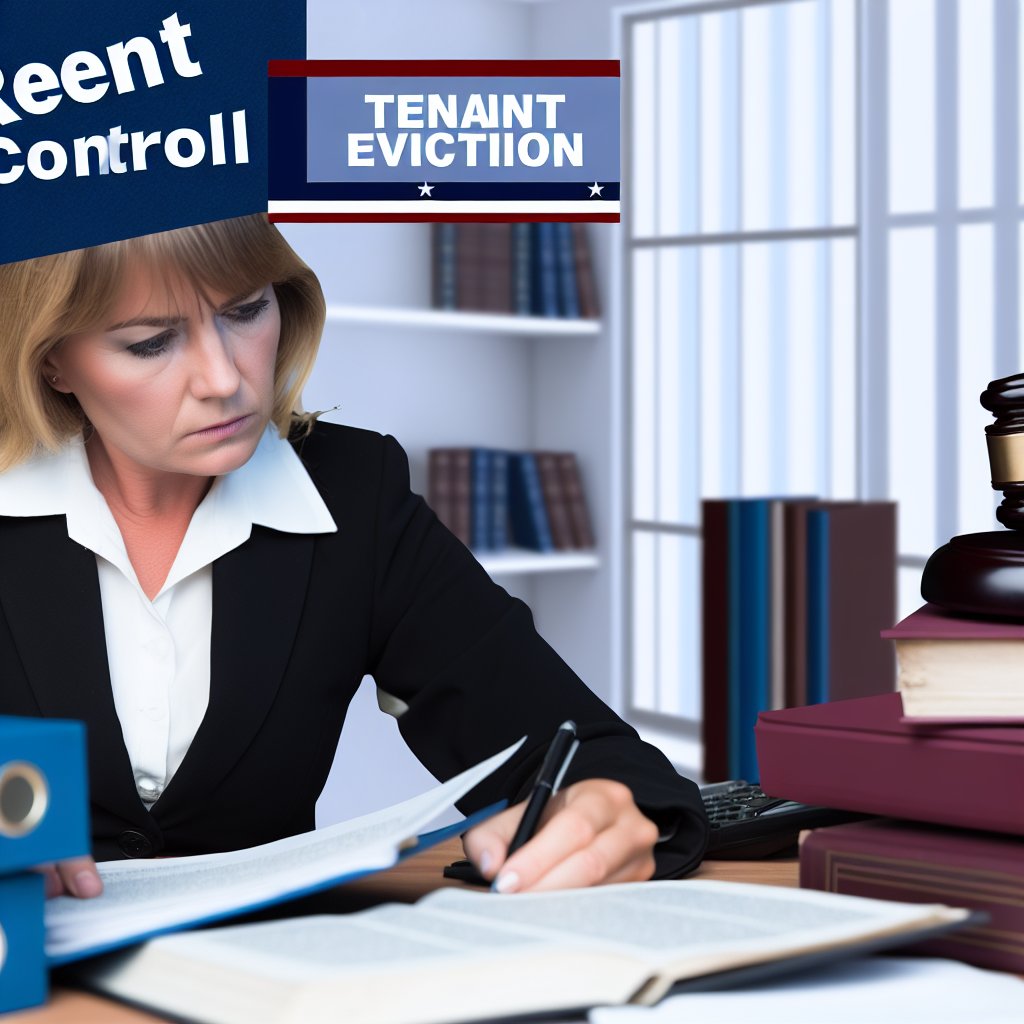Introduction to Rent Control Laws
Rent control laws are regulations that limit rent increases for residential properties.
They aim to protect tenants from sudden and excessive rent hikes.
In many urban areas, these laws help maintain affordable housing options.
Moreover, they promote stability in the housing market.
Purpose of Rent Control
The primary purpose of rent control is to ensure housing affordability.
This goal supports low and middle-income families.
Additionally, it aims to prevent displacement of long-term residents.
Furthermore, rent control can stabilize neighborhoods by reducing turnover rates.
Types of Rent Control
There are generally two types of rent control laws.
First, some laws limit how much landlords can raise rent each year.
Second, other laws set maximum rent prices for specific units.
Both types have unique implications for tenants and landlords.
Geographic Variations
Rent control laws vary significantly from one place to another.
Some cities have strict regulations, while others have none at all.
For instance, New York City has comprehensive rent control measures.
Transform Your Real Estate Decisions
Unlock personalized real estate insights crafted just for you. Get actionable advice designed to amplify your success.
Get StartedIn contrast, many smaller towns may have little or no rent regulation.
Overview of Tenant Eviction Policies
Tenant eviction policies outline the legal procedures for removing tenants from rental properties.
These policies are designed to protect both landlords and tenants.
They establish grounds for eviction and the process that must be followed.
Grounds for Eviction
Several grounds exist for evicting a tenant legally.
Non-payment of rent is the most common reason.
Additionally, lease violations, such as damaging property, can lead to eviction.
Lastly, landlords may evict tenants for illegal activities on the premises.
The Eviction Process
The eviction process typically involves several key steps.
First, landlords must provide written notice to the tenant.
This notice usually specifies the reason for eviction.
Next, if the tenant does not comply, the landlord may file a court petition.
Finally, a court hearing will determine whether eviction is justified.
Legal Protections for Tenants
Many jurisdictions offer legal protections to tenants facing eviction.
Showcase Your Real Estate Business
Publish your company profile on our blog for just $200. Gain instant exposure and connect with a dedicated audience of real estate professionals and enthusiasts.
Publish Your ProfileThese protections may include extended notice periods.
Additionally, some laws require landlords to prove just cause for eviction.
Moreover, tenants have the right to dispute an eviction in court.
Historical Context of Rent Control in the U.S.
Origins of Rent Control
Rent control in the U.S. began in the early 20th century.
Initially, it aimed to address housing shortages during World War I.
As housing demand surged, cities implemented rent control measures.
This approach aimed to stabilize housing costs and prevent exploitation.
Evolution Through the Decades
During the Great Depression, many cities expanded rent control policies.
These policies helped protect tenants from extreme rent hikes.
Additionally, they addressed rising unemployment and economic instability.
However, as the economy improved, many of these protections began to fade.
Legislative Changes in the 1970s
In the 1970s, rent control gained renewed focus as inflation soared.
Many cities faced significant housing shortages once again.
Activists pushed for more comprehensive rent regulation measures.
This led to tighter controls in various urban centers across the country.
Contemporary Landscape
Today, rent control varies by location, with many cities still enforcing it.
States like California and New York maintain stringent rent control laws.
These laws aim to protect tenants from sudden rent increases.
However, opponents argue that rent control can stifle housing development.
Current Debates and Impacts
The housing crisis has reignited debates over rent control effectiveness.
Supporters claim it makes housing affordable in high-demand areas.
Conversely, critics assert it limits property owners’ rights and investments.
Thus, the discussion continues as cities grapple with housing policies.
Key Components of Rent Control Laws Across Different States
Universal Principles of Rent Control
Rent control laws aim to protect tenants from excessive rent increases.
These laws often establish limits on how much landlords can raise rent annually.
In many states, rent control promotes housing stability for families.
Additionally, these laws help keep housing affordable in high-demand areas.
State-Specific Regulations
Each state has unique rent control regulations.
California, for instance, features statewide rent control laws.
New York City implements strict rent regulations to protect tenants.
Showcase Your Real Estate Business
Publish your company profile on our blog for just $200. Gain instant exposure and connect with a dedicated audience of real estate professionals and enthusiasts.
Publish Your ProfileOther states may allow cities to establish their own rules.
As a result, understanding local regulations is vital for tenants and landlords alike.
California’s Approach
California’s rent control laws limit annual rent increases to a specific percentage.
This percentage is often linked to inflation, which provides clarity for tenants.
Moreover, California prohibits landlords from raising rents above a certain threshold.
New York City’s Framework
New York City employs two primary systems: rent control and rent stabilization.
Rent-controlled apartments remain affordable for long-term tenants.
In contrast, rent-stabilized apartments can experience regulated rent increases.
Tenant Eviction Policies
Alongside rent control, eviction policies play a critical role.
Many states have instituted protections against unjust evictions.
These protections often require tenants to receive notice before eviction proceedings begin.
Additionally, some states mandate specific reasons for eviction, safeguarding tenant rights.
Notification Requirements
Notification laws vary from state to state.
Most jurisdictions require landlords to provide written notices of eviction.
These notices must typically include the reason for eviction.
Reasons for Eviction
Common grounds for eviction include failure to pay rent and lease violations.
Additionally, landlords may evict tenants for unlawful activities on the premises.
Understanding these reasons can help tenants secure their rights effectively.
Understanding Rent Control Laws and Eviction Policies
Awareness of rent control laws and eviction policies is essential.
Engaging with local housing authorities can provide updated information.
Furthermore, tenants must know their rights to navigate housing challenges confidently.
Delve into the Subject: Security Deposit Laws and Refund Guidelines for Landlords
Impact of Rent Control on the Rental Market and Housing Supply
Understanding Rent Control
Rent control refers to laws that limit rent increases.
These laws aim to keep housing affordable for tenants.
However, they often lead to unintended consequences.
Landlords may withdraw properties from the rental market.
As a result, the available housing supply can decrease.
Effects on the Rental Market
The rental market experiences various changes under rent control.
Firstly, it can create a shortage of rental units.
Landlords may choose not to invest in property maintenance.
Showcase Your Real Estate Business
Publish your company profile on our blog for just $200. Gain instant exposure and connect with a dedicated audience of real estate professionals and enthusiasts.
Publish Your ProfileThis lack of investment leads to deteriorating living conditions.
Consequently, the overall quality of rental housing declines.
Impact on Housing Supply
Rent control policies can significantly impact housing supply.
Builders may hesitate to create new rental units.
What’s more, existing landlords might convert units to condos.
This shift further reduces the rental unit availability.
As a result, low-income families bear the brunt of these changes.
Long-Term Market Shifts
Over time, rent control can alter housing market dynamics.
It may lead to increased rents in uncontrolled areas.
As controlled markets become less appealing, demand shifts.
Thus, tenants seeking affordable options may face challenges.
In the end, the market becomes segmented and inequitable.
Examining Alternatives
Policymakers must consider alternatives to rent control.
Incentives for affordable housing development can be effective.
Tax breaks or subsidies encourage landlords to maintain properties.
Moreover, these strategies can expand the overall housing supply.
Ultimately, sustainable measures are crucial for long-term solutions.
You Might Also Like: How To Monitor Rent Payments And Maintain Accurate Financial Records Easily
Tenant Rights Under Rent Control
Understanding Rent Control
Rent control laws establish limits on how much landlords can increase rent.
They aim to protect tenants from drastic rent hikes.
Additionally, these laws ensure housing affordability in urban areas.
State and local governments enforce different rent control regulations.
Therefore, tenants must understand the specific rules in their area.
Key Tenant Rights
Tenants have several important rights under rent control laws.
Firstly, tenants are entitled to fair notice before rent increases.
This notice period usually ranges from 30 to 90 days.
Secondly, rent increases are often limited to a certain percentage.
This percentage varies based on local laws.
Protection Against Eviction
Rent control laws also provide protections against wrongful eviction.
Landlords must offer valid reasons to terminate a lease.
Showcase Your Real Estate Business
Publish your company profile on our blog for just $200. Gain instant exposure and connect with a dedicated audience of real estate professionals and enthusiasts.
Publish Your ProfileCommon reasons include non-payment of rent or lease violations.
Moreover, landlords must follow legal procedures for eviction.
Tenants can dispute illegal evictions in court.
Reporting Violations
If landlords violate rent control laws, tenants can take action.
Tenants should document all violations thoroughly.
They can report these violations to local housing authorities.
Furthermore, legal assistance may be necessary to address issues.
Getting Help and Advice
Tenants experiencing issues with rent control should seek help.
Local tenant advocacy groups can provide valuable information.
Attorneys specializing in housing law can offer legal representation.
Ultimately, knowing one’s rights is crucial for every tenant.
Discover More: Lease Agreements for Subletting Tenants
Understanding Tenant Eviction Policies
Grounds for Eviction
Understanding the grounds for eviction is crucial for both landlords and tenants.
Landlords can evict tenants for various reasons under applicable laws.
Some common grounds include non-payment of rent, lease violations, and illegal activities.
Non-payment of rent is the most frequent cause of eviction proceedings.
Landlords typically must provide notice of non-payment before initiating an eviction.
Lease violations may include unauthorized pets, noise complaints, or property damage.
In this case, landlords must often give tenants a chance to rectify the issue.
Furthermore, engaging in illegal activities on the property constitutes a valid ground for eviction.
Such activities may include drug-related offenses or violent behavior.
Beyond these common grounds, some jurisdictions may allow evictions for other reasons.
For example, landlords may choose to terminate the lease for property renovations.
In many areas, strict guidelines dictate how landlords must handle eviction processes.
Thus, landlords should be well-versed in local eviction laws to avoid complications.
Additionally, tenants should familiarize themselves with their rights during an eviction.
Understanding the legal framework can empower both parties in eviction scenarios.
Finally, seeking legal counsel can provide clarity on specific situations or disputes.
See Related Content: Property Inspections for Rental Properties

The Legal Process of Eviction
Understanding Eviction Notices
Eviction notices serve as the formal initiation of eviction proceedings.
Showcase Your Real Estate Business
Publish your company profile on our blog for just $200. Gain instant exposure and connect with a dedicated audience of real estate professionals and enthusiasts.
Publish Your ProfileLandlords must deliver these notices to the tenant directly.
In general, evictions require proper documentation.
This includes the reason for eviction and a specified termination date.
Additionally, laws dictate the required notice period in your area.
Filing an Eviction Case
If the tenant does not leave, landlords can file an eviction lawsuit.
This process usually entails submitting documents to the local court.
Landlords must pay any applicable filing fees at this stage.
After filing, the court will schedule a hearing date.
Both parties will receive notification of the court date.
The Court Hearing Process
During the court hearing, landlords present their evidence.
The tenant also has an opportunity to defend themselves.
Judges will consider both sides before making a ruling.
If the judgment favors the landlord, a formal eviction order is issued.
This order allows law enforcement to assist with the eviction.
Executing the Eviction
After obtaining a judgment, landlords must follow local laws to execute the eviction.
Typically, law enforcement will assist in removing the tenant.
Landlords should ensure compliance with all legal requirements.
It is essential to avoid any actions that could be considered illegal eviction.
Timelines and Requirements
The timeline for eviction varies by jurisdiction and circumstances.
Generally, tenants have a set number of days to respond to an eviction notice.
After filing a lawsuit, the court process may take several weeks or months.
Landlords need to prepare for potential delays due to court schedules.
Finally, all procedures must adhere to local regulations to avoid complications.
Dispute Resolution: Mediation and Legal Resources for Tenants
Understanding Mediation
Mediation offers a way for tenants to resolve disputes without going to court.
A neutral mediator facilitates discussions between tenants and landlords.
This process encourages communication and aims for mutually agreeable solutions.
Mediation is often quicker and less expensive than litigation.
Additionally, it allows parties to maintain their relationship post-dispute.
Finding Mediation Services
Several organizations provide mediation services for tenants.
Local housing authorities often offer free or low-cost mediation programs.
Showcase Your Real Estate Business
Publish your company profile on our blog for just $200. Gain instant exposure and connect with a dedicated audience of real estate professionals and enthusiasts.
Publish Your ProfileNon-profit organizations, such as the Homeowners’ Association, may also assist.
Online resources can help tenants find mediation services in their area.
Community centers sometimes host mediation workshops for residents.
Legal Resources for Tenants
Tenants have several legal resources for assistance with disputes.
State and local laws govern tenant rights and responsibilities.
Community legal aid services offer free or reduced-cost legal advice.
These organizations often specialize in housing law and tenant advocacy.
Additionally, local law schools may provide legal clinics for tenants.
When to Seek Legal Help
Tenants should consider seeking legal help in specific situations.
If a landlord fails to address significant repair issues, legal advice may be necessary.
Furthermore, tenants facing eviction should consult legal professionals immediately.
Legal support can help tenants understand their rights and options.
In complex cases, having an attorney can provide essential protection.
Utilizing Online Resources
Many online platforms offer information about tenant rights and responsibilities.
Government websites often publish relevant legal guidelines for tenants.
Additionally, tenant advocacy groups maintain websites with helpful resources.
Online forums can connect tenants with others who share similar experiences.
These platforms offer a valuable community for advice and support.
Current Trends and Future Outlook on Rent Control Legislation
Understanding Recent Developments
Recently, many cities have implemented stricter rent control measures.
These measures aim to protect tenants from exorbitant rent increases.
Moreover, some local governments are revisiting existing rent control laws.
This trend responds to significant housing shortages in urban areas.
Consequently, lawmakers are exploring innovative solutions to address these challenges.
Analyzing Tenant Eviction Policies
Tenant eviction policies are evolving across various jurisdictions.
Many regions are tightening rules surrounding eviction processes.
These changes focus on ensuring fair treatment for tenants facing eviction.
Furthermore, communities are pushing for greater transparency in eviction filings.
Consequently, more states are mandating legal representation for low-income tenants.
Considering Future Legislation
Looking ahead, experts anticipate further modifications to rent control laws.
Many policymakers are prioritizing affordable housing initiatives.
Showcase Your Real Estate Business
Publish your company profile on our blog for just $200. Gain instant exposure and connect with a dedicated audience of real estate professionals and enthusiasts.
Publish Your ProfileThis trend reflects increasing public pressure for tenant protections.
Moreover, housing advocates are pushing for stronger tenant rights legislation.
As a result, we may see enhanced regulation of the rental market.
Impact of Economic Factors
The current economic climate significantly influences rent control discussions.
Inflation and rising living costs are driving more discussions around housing stability.
Consequently, many advocates argue for expanded rent control measures.
Additionally, many are exploring public funding options for affordable housing development.
This approach could alleviate some pressures from the rental market.
Additional Resources
General Information – Landlord/Tenant Law – Guides at Texas State …




